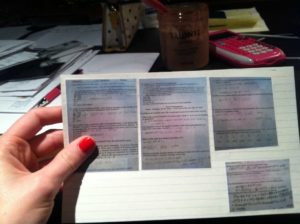Academic cheating can be defined as someone representing another’s work as their own. This can be done in many ways, including: copying another’s work, paying someone to do the homework or take a test, having the answers available on a test, etc.
“I cheat on homework if I don’t know the answers or didn’t have time to do it, and I don’t cheat on tests often. It all depends on the class and teacher,” said senior *Joe Johnson.
 There are various ways that cheating can take place. More recently, there have been new ways found due to technology. Cell phones are used for cheating 57 percent of the time according to ABC News. Cell phones can be used by looking at pictures of assignments or notes, looking up answers online or contacting a friend/peer for help.
There are various ways that cheating can take place. More recently, there have been new ways found due to technology. Cell phones are used for cheating 57 percent of the time according to ABC News. Cell phones can be used by looking at pictures of assignments or notes, looking up answers online or contacting a friend/peer for help.
“The main ways I cheat are by copying my friends’ work on a homework assignment or taking pictures on my phone to look at during a test,” said senior *Sally Smith.
There are several consequences of cheating besides just punishment for being caught. If caught cheating, most teachers will give no points on the assignment or test that was cheated on and most likely, depending on the severity of the case, the student caught will be sent to the office. According to the OHS Student Handbook, cheating can go on the student’s permanent record as ‘academic dishonesty’.
The other consequences concern the knowledge of the cheater and the other students. If a student is cheating, then they are not learning the material, resulting in less knowledge gained. Some teachers ‘curve’ their test, meaning they make the test out of the number the highest scorer got. Therefore, if a dishonest person cheats and does well, their grade could be taken for the curve. The students who actually took the time to study and didn’t do as well would be punished by the curve.
Students’ reasoning for cheating include: wanting to get better grades, not having time to study or do the assignment or simply not wanting to take the time to do it.
Junior *Catherine Carson said, “Sometimes cheating can be worth it, if you’re in a time crunch and the assignment really doesn’t matter. On a test I don’t think it is worth it because you don’t learn the material and you run the risk of getting caught.”
*Name has been changed
















































